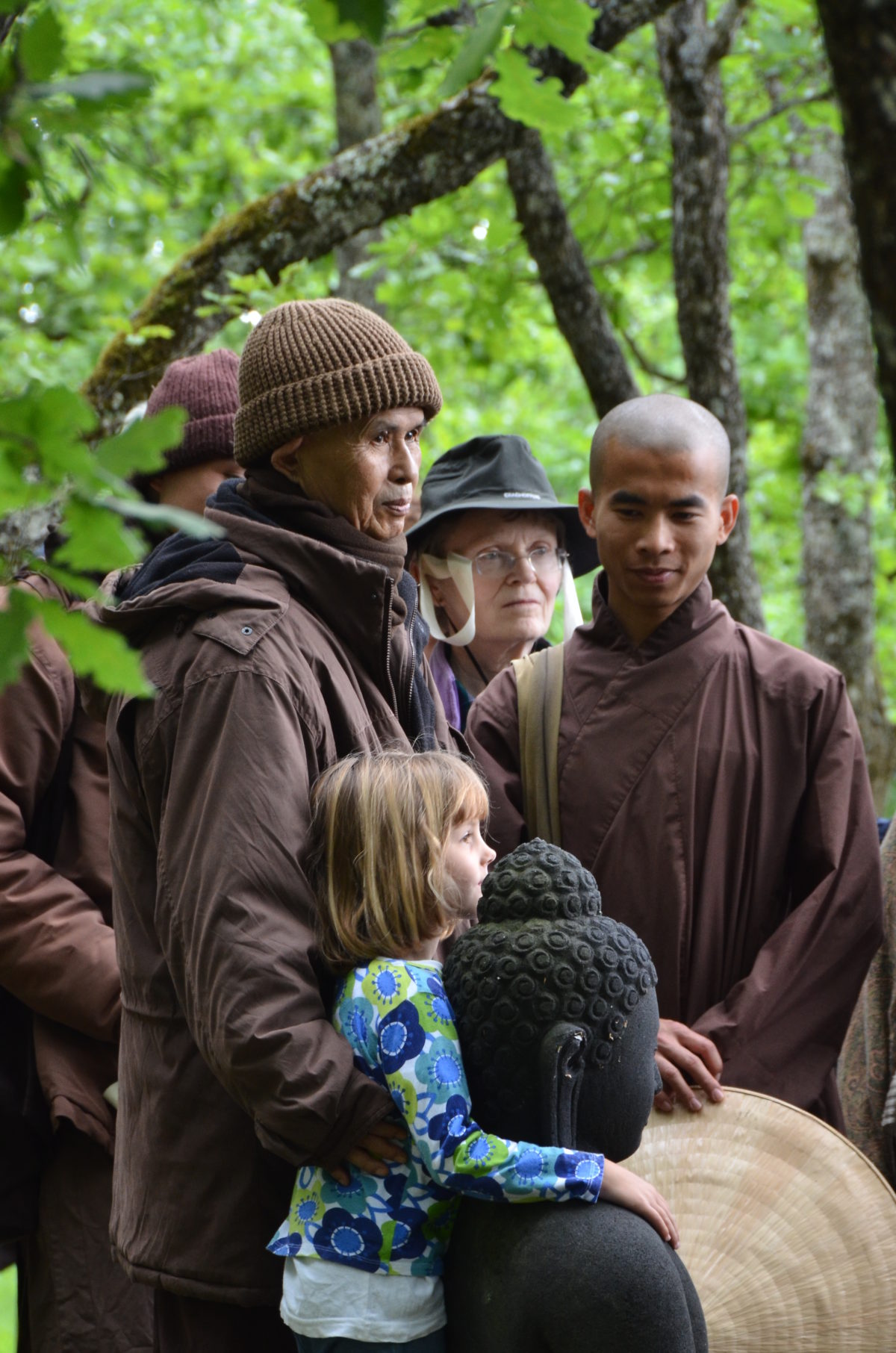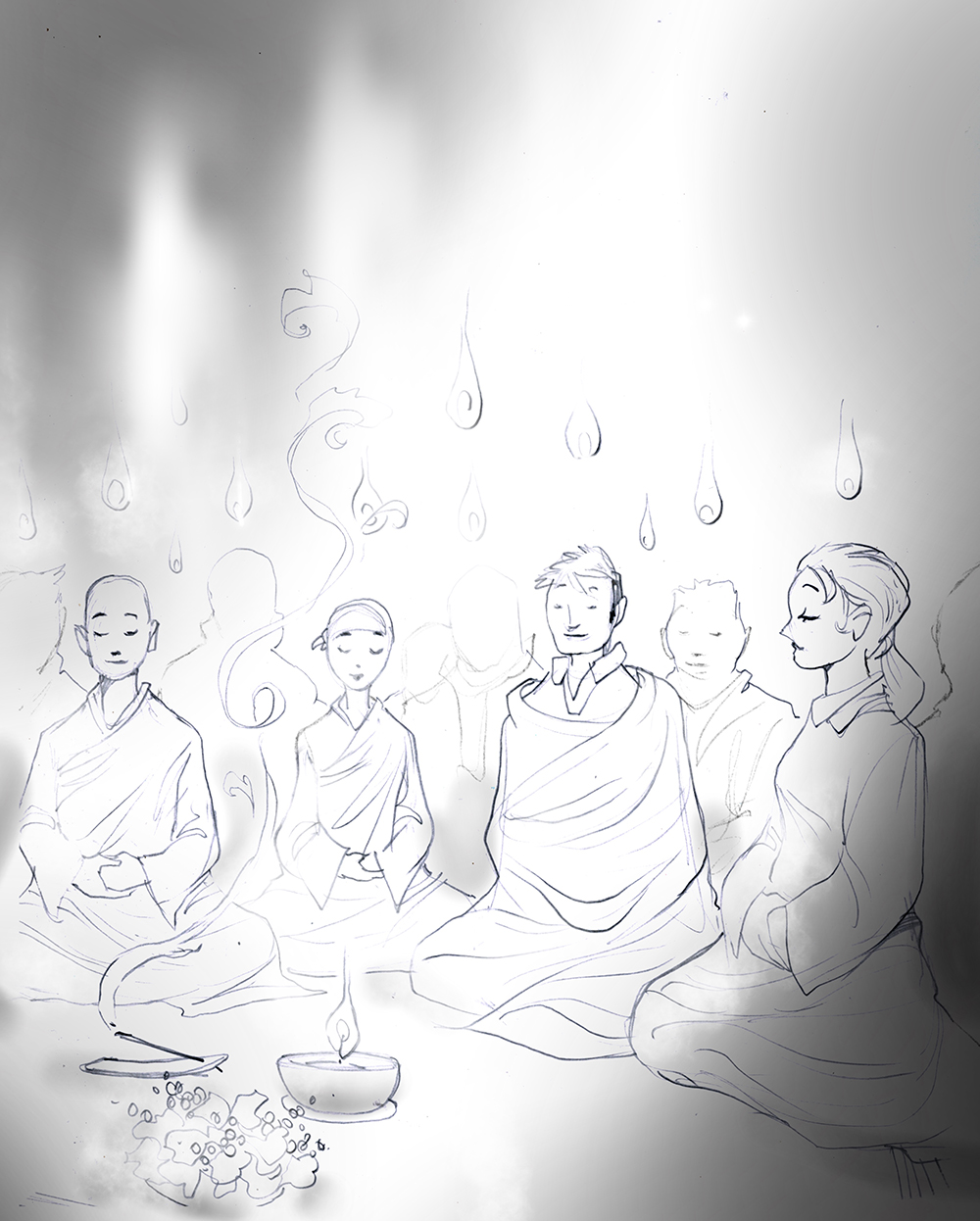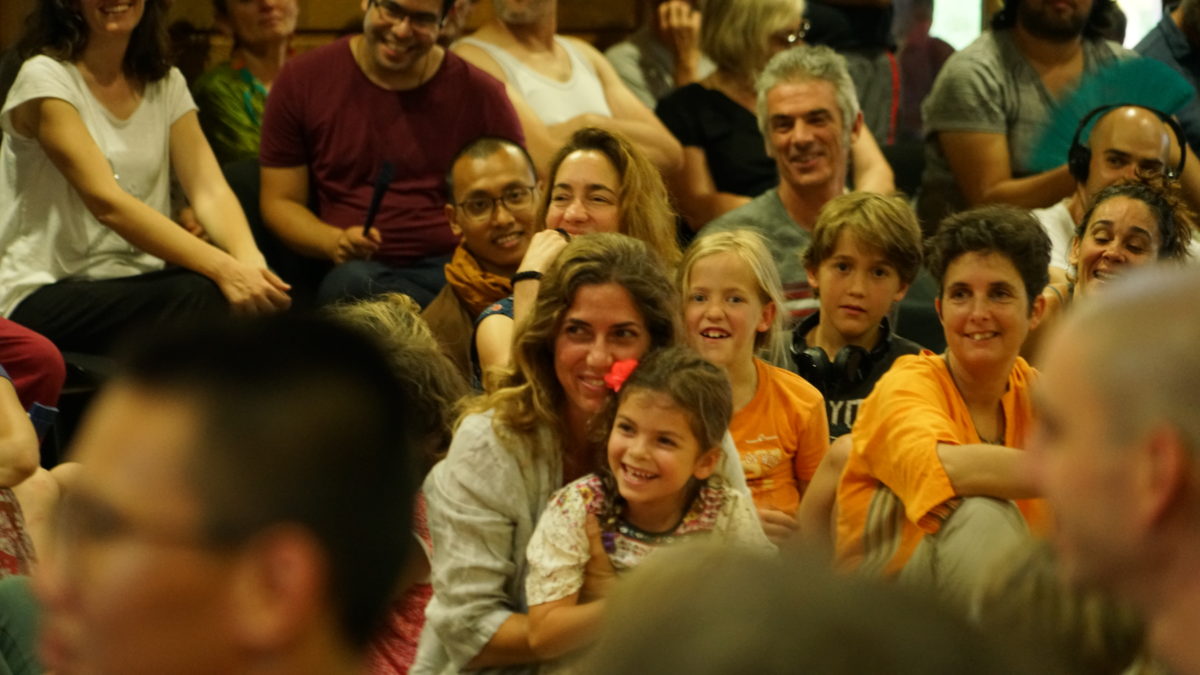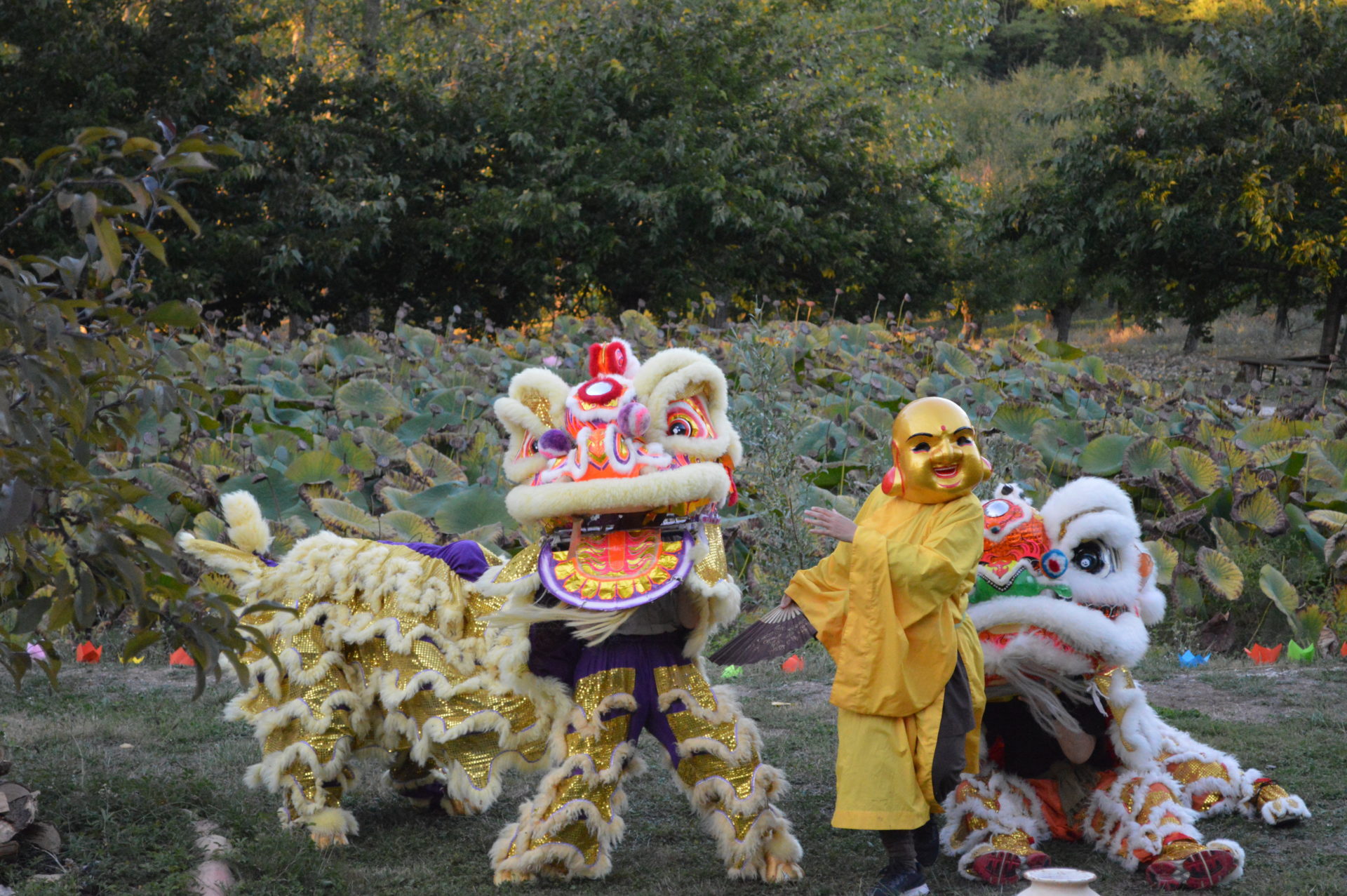By Thich Nhat Hanh

August 11, 2011
North American Tour
University of British Columbia
In the Five Mindfulness Trainings, we learn that Right Speech goes with loving speech and deep listening. Right Speech is free from discrimination and hate, from separation. When the father sees himself in the son,
By Thich Nhat Hanh

August 11, 2011
North American Tour
University of British Columbia
In the Five Mindfulness Trainings, we learn that Right Speech goes with loving speech and deep listening. Right Speech is free from discrimination and hate, from separation. When the father sees himself in the son, and when the son sees himself in the father, they know that they are not really two persons. They are the continuation of each other. The son is a continuation of the father in the direction of the future, and the father represents the continuation of the son in the direction of the past. Thanks to the father, the son has access to all ancestors. And thanks to the son, the father has access to the future. The two are linked. If both of them see the interconnection, the nonduality, then there’s no discrimination and no separation, and mutual understanding becomes easy.
That is why Right View is the foundation of Right Thinking and Right Speech. Right speech is what you say that goes in the direction of nondiscrimination, non-separation, that comes from understanding and compassion. The practice of right speech and deep listening is a wonderful instrument to restore communication.

Palestinians and Israelis
In Plum Village, we used to sponsor groups of Palestinians and Israelis to come practice with us. When they first arrived, it was difficult for the groups to even look at each other—much less to accept each other—because each group considered the other to be the origin of their suffering. We asked a number of monastic and lay members of the community to take care of these two special groups of people, who carried a lot of built-up anger and fear. The practice of total relaxation using exercises proposed by the Buddha in the Sutra of Mindful Breathing, to connect with the body, to release the tension in the body, to recognize and embrace feelings of pain, anger, and despair is crucial. We practiced with them, lending them energy so they could calm the tension in their bodies and the pain in their minds. It was very important to start with the practices of relaxation and sitting and walking.
After a week or so, we began to initiate them into the practice of deep listening and loving speech, putting the Fourth Mindfulness Training into practice. Those of us who have the capacity to be peaceful, mindful, and concentrated sat with them. The group of experienced practitioners needed to be large enough to create an atmosphere of good energy. We practiced inviting the bell, breathing, walking, and sitting. Then we asked the Palestinian group to express themselves, while the Israeli group and the rest of us just listened.
The purpose of deep listening is to give each group of people a chance to speak out. Maybe no one has listened to them before. You may be the first ones who have the capacity to sit quietly and listen to them. One hour of deep listening, compassionate listening, can bring them a lot of relief. They can empty their heart.
In psychotherapy we call it empathic listening. In the Buddhist tradition, we use the expressions deep listening and compassionate listening. It means you listen with only one purpose: to allow the speaker to suffer less. As you listen, you practice mindfulness of compassion; what the other person says cannot touch the seeds of irritation and anger in you because compassion is a wonderful kind of energy that protects you. Even if what the other person says is full of accusation, complaint, blame, bitterness, or wrong ideas, the seeds of irritation and anger in you are not watered, because you are protected by the energy of compassion.
If you do not practice mindfulness and compassion, your seeds of anger and irritation will be touched by what the other person says, and you will lose your capacity to listen. If you interrupt or correct, the session becomes a dispute instead of a session of deep listening. That is why when you sit down and listen, you have to follow your in-breath and out-breath and remember just one thing: I listen like this only to allow the speaker to suffer less.
This is the practice of the bodhisattva Quan Yin, Avalokita. There is a Quan Yin inside us. You can do it; you can play the role of the bodhisattva of compassionate listening. You can listen to your husband; you can listen to your wife; you can listen to your father, your son, as the bodhisattva. The bodhisattva of deep listening is not in the clouds. He is, she is in your heart. Invite him to manifest to help you to listen.
Every one of us has the seed of compassion inside. That is the Buddha inside us. The Buddha inside us is not just an idea—it’s a reality. We have the capacity of being compassionate, of being understanding. We have the seeds of forgiveness and joy and peace and liberation in us. That is the Buddha inside. We have to trust the Buddha inside and allow it to have a chance to operate. Just by practicing mindful breathing, the Buddha will manifest and help us.
When you notice what the other person says is full of wrong perceptions, you still smile and say to yourself, “Poor person, they are a victim of so many wrong perceptions. Where did they get that information?” But you don’t interrupt. Your job now is just to listen with all your heart. You say to yourself, “In the next week, I will have time to offer information to correct their perception, but not now. Now is the time to listen.” If we can listen like that for one hour, it will be very healing. You are the bodhisattva of compassionate listening. You have confidence in the practice. One hour can bring your loved one a lot of relief.
The group of Israelis was given these instructions, so when they listened to the group of Palestinians they knew how to protect themselves. And we gave the Palestinian group instructions on how to speak: you can share everything in your heart, but try not to condemn or to accuse; try to use loving speech. You can share all kinds of suffering that you and your people have undergone. You have to tell us everything! But try your best to use the language of non-accusation and non-blaming. And don’t show your bitterness. Just tell us everything about your suffering; that will make it easier for the other group to receive your message.
The session doesn’t begin until both groups have been briefed on the way to speak and to listen. You can see the result of the practice after the first session. After the first hour, the Israeli group reported that they were surprised to discover that the suffering of the other group looked very much like their own suffering. For the first time, they saw the other group not as enemies but as human beings who suffered like they did. Until this exercise, they thought they were the only group that suffered; the other camp just wanted to make them suffer. Those wrong perceptions are removed during the first session of practice. When you see the other group as human beings who suffer as you have, suddenly there is compassion in you. When you look at them with compassion, you don’t suffer anymore. And when they see you looking at them like that, they don’t suffer anymore. The miracle happens like this in the first session of the practice.
We gave them several sessions of practice, as one is never enough. As each side practices deep listening and loving speech, understanding begins to blossom. When you hear the suffering of the other side, compassion arises in you, and healing takes place. Compassion is the antidote to anger and hate. After they have practiced listening for several days, they are able to share a meal together and do walking meditation. It’s very moving to see Palestinians and Israelis holding hands while doing walking meditation. It’s very beautiful.
On the last day of the retreat, they came together as one group and reported to the whole Sangha on the progress of their practice. They promised that when they go back to the Middle East, they will organize a Sangha so that other Palestinians and Israelis can join them in practice and learn to suffer less. There are now several Sanghas there. Every year monks, nuns, and lay Dharma teachers go to Israel and Palestine to offer retreats of mindfulness. An Israeli nun in Plum Village helped put together a book Peace Begins Here: Palestinians and Israelis Listening to Each Other on this subject.

The Work of Politicians
When politicians organize peace negotiations, they can apply some of our techniques. When they come together they tend to see the other group as enemies instead of as human beings, and they believe that the other side makes our side suffer but does not suffer themselves. They are afraid and suspicious because they cannot connect with them as human beings. That is why peace negotiations cannot result in anything substantial.
If we were asked to help, we would propose that the negotiators start by having sessions of total relaxation to calm down, to learn to embrace fear, anger, and suspicion, and to be in touch with the suffering not only inside our camp but inside the other camp as well. Monks and nuns and lay practitioners could help both groups to be initiated into the practice of compassionate listening and loving speech. I think the result of such peace negotiations would be much more productive, and possibly shorter, because in the process so much discrimination and fear and anger could be removed as they come to understand each other as human beings, seeing the suffering and fear of those on the other side.
Politicians should be trained in this discipline. If you are a professor of political science, try to bring this kind of practice into the school of politics and help bring a spiritual dimension to political life. It’s very important.
Watering Seeds
Every one of us has the seeds of understanding, compassion, and forgiveness in us. In a retreat we have a chance to breathe, to walk, to listen to a Dharma talk. A Dharma talk is like rain—the Dharma rain. If we listen to the Dharma talk only with our intellect, we tend to compare this idea with other ideas. But the Dharma talk is not just ideas. The Dharma talk comes from the living experience of a teacher, not from the ideas they have learned from books. The best way to listen to a Dharma talk is to remove the intellect and allow the Dharma rain to penetrate deeply into your store consciousness. Your intellect is like a sheet of plastic that prevents the rain from penetrating the soil. When you listen with your intellect, you compare what you hear to what you already believe. Whether you agree or not, you learn nothing.
We have to send our intellect on a vacation and allow the Dharma rain to penetrate the soil of our store consciousness, because there are so many good seeds in the cellar, the seeds of understanding, nondiscrimination, compassion. A Dharma talk waters the best of the seeds in us. During a Dharma talk, if the Dharma rain has penetrated your wellbeing, you feel wonderful. In the time of the Buddha many people got enlightened just hearing a Dharma talk, because they allowed the Dharma talk to enter them deeply and touch the best in them.
One of the seeds is the seed of awakening, of enlightenment. During the first, second, third, and fourth day of walking, sitting, breathing, and listening to a Dharma talk, we witness the transformation inside us. The seeds of anger, fear, and so on are not watered but the positive seeds are watered every day.
On the fifth day, we ask the practitioners to put into practice the teaching of deep listening and loving speech. We say, “Ladies and gentlemen, now is the time for us to use the instruments we have received from the Buddha to restore communication with the person we are having difficulties with. You have until midnight to reconcile with them. If your difficult person is in the retreat it is easy because their good seeds have been watered. If you use loving speech, you continue to water their good seeds and reconciliation can happen easily. If the other person is not in the retreat, you are authorized to use your cell phone.”
Once in a retreat on Macao, many ladies came to me during breakfast and reported that the previous night they had called their husbands and were able to reconcile with them. In a retreat in north Germany, four gentlemen came to me and said, “Thay, we called and reconciled with our fathers last night.” One gentleman said, “Thay, I couldn’t believe that I was able to talk to my father that way. I was so angry with him, but when I followed your instructions—breathing in and out and getting in touch with the suffering inside my father, suddenly I heard his voice, and I was able to talk to him very nicely. It has been many years since I have spoken to him that way.” During the first four days of the retreat the seeds of compassion and understanding in him had been watered by the Dharma talks and the practice. That is why he was able to use loving speech with his father. When you get in touch with the suffering in the other person, compassion arises in you, and it is natural to use loving speech.
Miracles of reconciliation always happen in our retreat, and that brings us a lot of joy. It nourishes those of us who organize retreats because in just four or five days we can help people reconcile and suffer less. It’s very wonderful. We should not underestimate the power of the Fourth Mindfulness Training. The Fourth Mindfulness Training can restore communication and realize reconciliation not only between two people, but between two groups, and even two nations. If you are a politician or a professor of politics, if you work in the realm of international activism, you might like to consider bringing this instrument into your work to help with restoring communication and bringing about reconciliation.
True Diligence
The teaching of True Diligence in Buddhism has four aspects. You should understand your mind to some degree to practice it. The mind in Buddhism has at least two layers. The lower part of a circle represents store consciousness and the upper part mind consciousness. We know that there are many seeds lying at the bottom of store consciousness—good seeds and negative seeds. There are seeds of despair, of anger, of discrimination. The worst are there; hell is in us. The practice of diligence is to not give hell a chance to manifest. Heaven is in us, too; the Kingdom is in us, the Pure Land. Let us practice True Diligence to give the Kingdom, the Pure Land, Paradise a chance to manifest.
In Buddhist psychology, there are fifty-one categories of seeds. Physics speaks of particles; Buddhist psychology speaks of seeds. We don’t see them, but we know they are there because they manifest for us to see. Like in quantum physics, you don’t see the quarks but you know they are there. The Sanskrit word for seed is bija. In addition to the positive seeds and the negative ones, there are those that can be either good or not good, depending on the circumstances. There is a seed of anger down here. Even when you are very joyful, when you are loving and understanding, the seed of anger is still there. If someone says or does something that touches that seed of anger, it will manifest up here as the energy of anger. When it manifests here, it is no longer called a bija, a seed, but a samskara. In English, a mental formation. A seed down there manifesting up here is called a mental formation.
Formation is a technical term in Buddhism that means composite things. For example, this flower is a formation. It is made of non-flower elements like sunshine, clouds and rain, minerals, and so on. The flower is a physical formation. My hand is a physiological formation. My anger is a mental formation. As a good practitioner you have to be able to identify each of the fifty-one mental formations when they manifest. That is the object of the practice of the nine exercises of mindful breathing; the ninth one is to recognize every mental formation as it manifests. When anger is up here, you breathe in and say, “Breathing in, I know anger has manifested.” A simple recognition of anger as a mental formation.
When anger manifests, the practitioner invites the mental formation called mindfulness to come up. With mindfulness, you can recognize anger. “Breathing in, I know anger has manifested. Breathing out, I will take care of you, my dear anger. Mindfulness is an energy, and anger is an energy. The energy of mindfulness recognizes anger, embraces that anger, and brings relief.
The first aspect of the practice of Right Diligence is not allowing the negative seed—like anger, craving, or fear—to manifest. If you are a true practitioner, you don’t give them a chance to manifest. The Fifth Mindfulness Training teaches us that what arises comes from what we consume. Suppose you watch television without mindfulness. You are not aware that the television program has a lot of anger, despair, fear in it. You and your children watch that film and consume toxins, watering the seeds of anger, craving, and fear, and they manifest. And if they grow strong, it’s not good for you or your child. That is why the first aspect of the practice is not to give negative seeds a chance to manifest, because once they do, the seed becomes stronger at the base.
We have to apply this in our relationships. We look at our partner, and say, “Darling, I have some negative seeds in me. If you water these seeds—like jealousy, anger, fear—I will suffer, and if I suffer you cannot be happy. So, please refrain from watering the negative seeds in me. And I make a vow not to water them in myself. I also make a vow not to water them in you.” This is a peace treaty, a love treaty that you sign with your beloved one: not to allow the bad seeds in each other to have a chance to manifest. That’s the first aspect of the practice.
But if it happens that a seed like anger or despair has manifested, what to do? The Buddha recommended how to help that mental formation go back as quickly as possible to its original position. The practice is not to fight it or suppress it, but to recognize it, with mindfulness. You have many beautiful seeds down there, so you can invite one of them to come up—especially one that is the opposite of the negative seed. For example, when you play a CD and you don’t like that music, why do you allow that music to continue? You change the CD. This was proposed by the Buddha. You have plenty of beautiful CDs down there. Why not play them, rather than allowing this one to go on and on and destroy you and your beloved one?
The second aspect of this practice: If a negative seed has manifested as a mental formation, help it return by inviting a good one to take its place. The Buddha used the image of a carpenter who uses pegs to connect two blocks of wood. If the peg is rotten you have to change the peg and put in a new one. You put it exactly at the spot of the rotten one and use a hammer to drive the new peg into place while you remove the old one. So “changing the peg” is an expression used by the Buddha. This is the second practice of diligence: don’t let that mental formation—anger, fear, craving—stay too long. Change the peg. Change your CD.
The third aspect of the practice: allow many opportunities for the good seeds to come up. You have so many beautiful seeds, why don’t you invite them? In a retreat, our good seeds have many chances to manifest: the seeds of forgiveness, understanding, compassion, peace, and so on. As a co-practitioner you can help your partner. If you see that your partner is the victim of a bad seed you can help her to change her CD. “Darling, what are you thinking? Why do you allow that anger, that fear to overwhelm you like that when you have plenty of beautiful seeds down there?” You touch the best thing in him or in her so that they can come up.
We are co-practitioners; we have each other to help us in the practice. As good practitioners, we know how to help the good things in us to manifest. We can say or do something to help the best seeds in our partner to manifest. You help make him or her happy, and you profit from his or her happiness. This does not take a long time. It may be done very quickly.
One day I gave a talk on this method. We call it the practice of selective watering, choosing only to water the good seeds. I noticed there was a lady in the audience who cried from the beginning to the end of the talk. After the talk, I went to her husband and said just one thing: “Dear friend, your flower needs some watering.” The couple came from Bordeaux, and during the hour it took to drive home, he practiced selective watering. He told her how wonderful she was and how talented she was. When they arrived home, their children were very surprised at how joyful their father and mother were. If you know the art of selective watering, you can change the situation in just five or ten minutes. It works.
The fourth aspect of True Diligence: If a good seed has manifested, try to keep it there as long as you can. It’s like when you have a good friend visiting; you try to keep them with you as long as possible. If the seed of joy, happiness, forgiveness, or compassion has manifested, practice mindful breathing and walking to keep it alive, because while it’s manifesting here at the base, the seed continues to grow.
That is the practice of transformation at the base. You don’t know it, but down there the good seeds are growing, and the next time you need them, they can come up very easily. This is the true meaning of the practice of Right Diligence.

